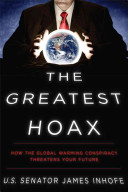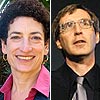 I decided to take a look at Senator Inhofe’s newly published book The Greatest Hoax: How the Global Warming Conspiracy Threatens Your Future, thinking I might get a better understanding of what impels a politician like him into aggressive denial of climate science and opposition to any moves to tackle the climate crisis. It wasn’t difficult to find out. He is a virulent opponent of what he regards as government over-regulation. He describes earlier in life working “long hard hours” as a developer, and finding the chief obstacle to “living out my American dream” was the government. Bureaucrats, “pseudo-intellectuals in Washington who think they know best”, are holding back the enterprising spirit on which the American economy depends.
I decided to take a look at Senator Inhofe’s newly published book The Greatest Hoax: How the Global Warming Conspiracy Threatens Your Future, thinking I might get a better understanding of what impels a politician like him into aggressive denial of climate science and opposition to any moves to tackle the climate crisis. It wasn’t difficult to find out. He is a virulent opponent of what he regards as government over-regulation. He describes earlier in life working “long hard hours” as a developer, and finding the chief obstacle to “living out my American dream” was the government. Bureaucrats, “pseudo-intellectuals in Washington who think they know best”, are holding back the enterprising spirit on which the American economy depends.
It’s not my purpose in this post to discuss Inhofe’s politics per se. It’s how they impinge on the challenge of climate change that concerns me. So far as I could see in reading his book climate change is denied in the name of free enterprise, the lifeblood of the American economy.

 Naomi Oreskes and Erik Conway have an interesting
Naomi Oreskes and Erik Conway have an interesting